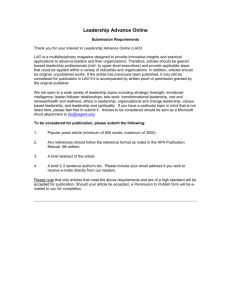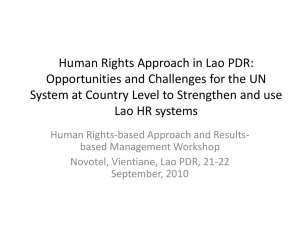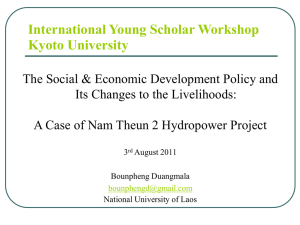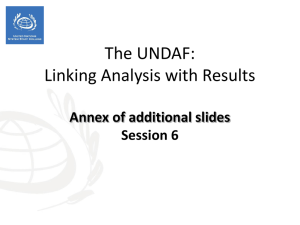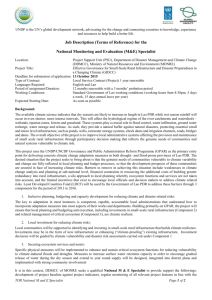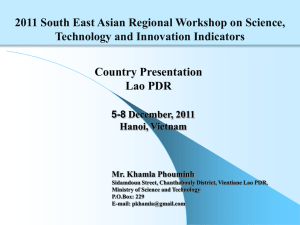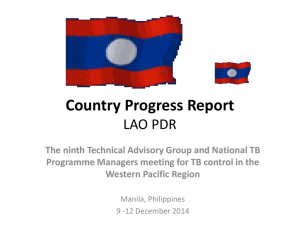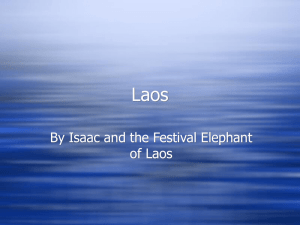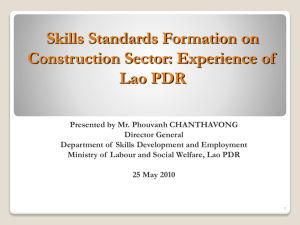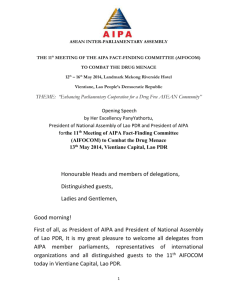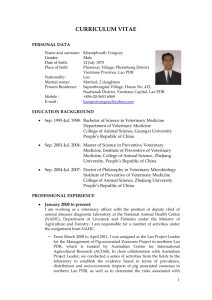Regional Economic Integration and Inclusive Growth in Lao Peoples
advertisement
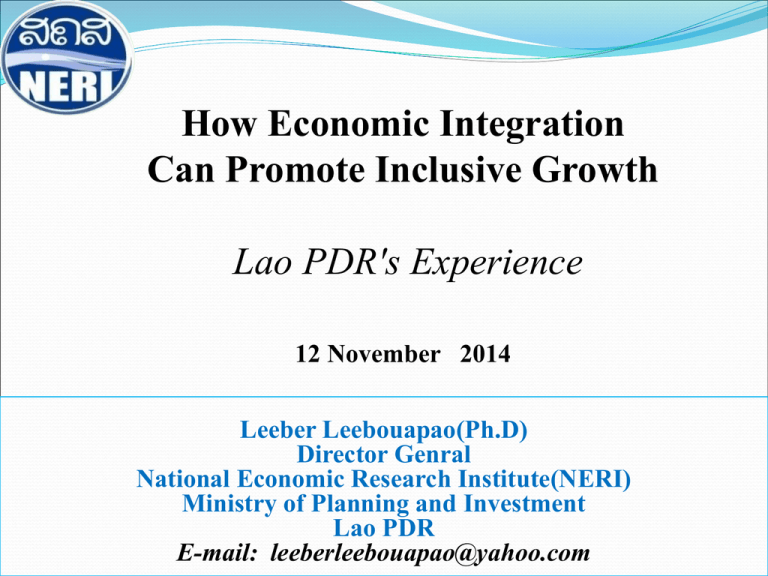
How Economic Integration Can Promote Inclusive Growth Lao PDR's Experience 12 November 2014 Leeber Leebouapao(Ph.D) Director Genral National Economic Research Institute(NERI) Ministry of Planning and Investment Lao PDR E-mail: leeberleebouapao@yahoo.com Points of Discussion Lao PDR’s National Economic Development Strategy and Economic Integration Policy Framework Recent Macroeconomic Performance Poverty Incidences and Policy Opportunities and Challenges of Lao PDR’s Economic Integration ( AEC by and after 2015 ) Policy Recommendation Lao National Socio-Economic Development Policy/Strategy and Economic Integration Policy Framework Economic Integration Policy Framework 1975-1986: Socialist or Centrally Planned Economy 1986: NEM Shifting from centrally planned economy to a market oriented economy ( Price liberalization, fiscal reform, SOE reform, banking reform, government employee reform, more open economy ) 1997: Member of ASEAN 2008: AFTA 2012: Member of WTO 2015: Member of AC(APSC, AEC, ASCC) The National Social-Economic Development Policy/Strategy Key Targets of NSEDP/S: Vision 2020 Target: To graduate from the status of LDC by 2020 VII Five Year NSEDP(2011-2015) To achieve MDG’s To join AEC by 2015 GDP growth: more than 8% per year The National Social-Economic Development Policy/Strategy(Cont.) Industrialization Strategy: Electricity Industry Agro-processing Industry Mining Industry Tourism Industry Construction Material Production Industry The National Social-Economic Development Policy/Strategy(Cont.) Land-Linked Strategy Connectivity 8 North-South Corridor-B The Geographic Focus Mukdahan Quang Tri East-West Corridor Beantey Meanchey Sa Keo Savannakhet Tay Ninh Svay Rieng 9 Recent Macro Economic Performance GDP growth (%) GDP Growth 8.40 8.20 8.32 8.20 8.09 8.03 7.97 8.00 7.89 7.80 7.80 7.57 7.60 7.40 7.20 7.00 2005-06 2006-07 Source: Lao Bureau Statistics 2007-08 2008-09 2009-10 2010-11 2011-12 2012-13 GDP Growth by Sectors (%) 9.66 14.45 7.42 8.05 5.16 2.95 2.79 3.14 2.00 2.98 4.00 2.03 6.00 3.05 4.87 8.00 7.12 6.87 9.21 6.61 7.11 10.00 9.74 14.00 9.54 8.97 13.28 16.00 15.18 16.60 18.00 12.00 17.72 20.00 2008-09 2009-10 2010-11 2011-12 2012-13 0.00 2005-06 2006-07 2007-08 Services Source: Lao Bureau Statistics Industries Agriculture Contributions and GDP growth (%) 9.0 8.0 6.8 6.8 7.0 6.3 6.4 6.0 0.3 0.3 5.0 5.0 4.0 1.0 0.0 3.6 3.5 4.1 3.5 3.7 1.0 0.2 0.3 0.5 Services 3.0 2.7 2.0 2.7 Industry 4.1 3.9 3.6 3.9 1.9 2.7 1.8 1.3 1.40 3.7 1.4 1.4 0.6 Taxes on products and Import duties, net 3.60 3.2 4.0 7.6 8.1 8.3 8.0 7.9 0.7 0.7 0.6 0.3 0.8 1.4 3.0 2.0 1.1 0.6 0.8 1.9 0.6 8.2 8.0 7.8 0.5 0.7 2.12 2.4 Agriculture 1.6 1.0 0.9 0.9 0.8 0.85 GDP Source: Lao Bureau Statistics GDP per capita in US$ Inflation (%) 15.5 10.5 Source: Lao Bureau Statistics 6.4 2011 2013 4.3 0.0 2008 2007 2006 2005 2004 2003 2002 4.5 6.1 7.5 2012 7.6 7.2 6.8 2010 7.8 2009 10.7 2001 18 16 14 12 10 8 6 4 2 0 The Current Status of the Lao Foreign Trade Main ExportingFY 1999Markets FY 20042004 2009 FY 20092012 1 Thailand 46% 38% 56% 2 Australia 6% 10% 18% 3 Viet Nam 7% 12% 8% 4 China 3% 5% 4% 5 United Kingdom 1% 7% 1% 6 Japan 1% 1% 2% 7 Germany 3% 4% 2% 8 Switzerland 3% 5% 2% 9 Netherland 1% 1% 1% 10 Italy 2% 1% 1% Top 9 Export Items from Laos No. Export Items FY1999-2004 FY2004-2009 FY2009-2012 1 Minerals 61.77 (16%) 495.57 (50%) 1,048.52 (59%) 2 Electricity 94.93 (25%) 127.93 (13%) 289.00 (16%) 3 Garment 96.14 (26%) 152.53 (16%) 167.30 (9%) 4 Agriculture and live animals 82.49 ( 22%) 88.51 (9%) 119.24 (7%) 5 Other Industrial goods 10.77 (3%) 69.57 (7%) 113.62 (6%) 6 Wood & wood products 73.13 (19%) 69.32 (7%) 37.11 (2%) 7 Diamond 18.83 (2%) 12.74 (1%) 8 Forestry Products 8.67 (2%) 5.09 (1%) 1.01 (0%) 9 Handicraft 5.23 (1%) 1.03 (0%) 0.40 (0%) Unit: million USD (share to total) 0 Main Import Markets FY 1999FY 20042004 2009 FY 20092012 1 Thailand 26% 64% 52% 2 China 5% 9% 12% 3 Viet Nam 4% 12% 8% 4 France 0% 0% 4% 5 Japan 0% 2% 3% 6 South Korea 0% 0% 1% 7 Belgium 0% 2% 2% 8 Germany 1% 0% 0% 9 Denmark 0% 1% 0% 10 Taiwan 0% 1% 0% Top 10 Import Items to Laos No. 1 Import Items Capital goods (ODA, Loan projects, FDI) 2 Fuel and Gas 93 (17%) 206 (21%) 333 (20%) 3 Vehicles and space parts 25 (5%) 75 (8%) 107 (6%) 4 Food stuff 19 (3%) 24 (2%) 92 (5%) 5 Luxury goods 3 (1%) 9 (1%) 71 (4%) 6 Clothing and daily use commodities 14 (3%) 22 (2%) 54 (3%) 7 Agriculture Inputs 16 (3%) 17 (2%) 48 (3%) 8 Electricity 7 (1%) 21 (2%) 47 (3%) 9 Eletricit Appliances 4 (1%) 10 (1%) 38 (2%) 10 Construction materials 27 (5%) 27 (3%) 32 (2%) Unit: million USD (share to total) FY1999-2004 FY2004-2009 FY2009-2012 179 (33%) 319 (32%) 700 (42%) Top 10 Import Items to Laos( FY 2009-2010) 3% 2% 2% Capital goods (ODA, Loan projects, FDI) Fuel and Gas 3% 3% 4% Vehicles and space parts Food stuff 5% 42% Luxury goods Clothing and daily use commodities Agriculture Inputs 6% Electricity Eletricit Appliances 20% Construction materials Top 9 Export from Laos (FY 2009-2010) 2% 1% 0% 0% Minerals 6% Electricity 7% Garment Agriculture and live animals 9% Other Industrial goods Wood & wood products Diamond 59% Forestry Products 16% Handicraft Foreign Direct Investment (Mill USD) FDI by Sector (%) 100.00 2.75 5.10 4.84 4.28 1.65 3.90 5.80 10.42 17.13 18.91 15.84 18.85 14.50 80.00 4.29 8.53 9.07 17.62 5.06 0.73 47.05 0.69 26.60 13.88 23.36 24.46 37.40 60.00 53.72 85.54 85.61 56.17 89.78 72.80 40.00 31.71 31.54 52.65 65.81 23.55 52.88 20.00 0.00 18.21 15.94 21.41 21.24 1.94 2.12 4.43 0.00 2000 14.28 2001 5.13 0.13 0.97 4.04 6.17 2002 2003 2004 7.51 1.39 0.45 2.73 2005 2006 Agriculture Mining Services Manufacture 10.14 8.40 2007 2008 8.93 2009 2010 2011 Electricity Generation FDI by Country (%) 100% 5.37 90% 23.34 33.92 80% 42.95 43.03 46.16 9.53 7.95 3.37 6.05 26.35 42.71 47.25 21.34 9.54 70% 36.46 66.08 70.81 60% 27.06 4.77 50% 11.54 39.24 28.02 22.60 40% 46.57 1.19 30% 51.06 64.66 47.03 36.71 20% 50.64 11.23 18.10 26.09 28.12 12.42 5.58 6.64 2000 2001 5.17 2002 6.00 16.05 15.63 2007 2008 11.17 4.47 2.03 2003 41.22 5.54 10% 0% 11.22 2004 Vietnam 2005 2006 China 2009 2010 2011 FDI by Sectors (Million US Dollars) 2001 2002 2003 2004 2005 2006 2007 6 1,065 1,777 361 Electricity Generation 360 1,295 86 9 2 24 596 94 12 181 Mining 1 10 49 12 13 32 58 Hotel & Restaurant 1 14 3 31 2 131 0 Construction 19 14 19 51 17 74 115 Agriculture 5 0 0 10 5 0 0 Banking 60 81 35 15 459 184 Industry & Handicraft 5 10 17 60 17 21 123 134 Services 3 5 6 9 6 0 25 Wood Industry 0 13 0 27 0 1 57 Telecom 3 8 140 19 8 86 14 Trading 0 0 0 0 0 0 0 Public Health 4 4 3 3 0 4 6 Garment 1 1 1 2 0 2 2 Consultancy 0 0 0 0 0 0 0 Education 421 1,442 471 819 1,245 2,700 1,137 Total Sector Source: Ministry of Planning and investment 2008 640 24 29 67 102 32 78 157 43 21 13 0 5 4 0 1,216 2009 218 1,055 44 27 290 84 290 199 77 14 17 0 1 7 0 2,322 2010 457 269 126 81 551 12 325 551 24 1 75 8 1 14 5 2,499 2011 25 1,757 24 257 609 106 361 234 4 45 32 50 8 7 2 3,520 2012 1,232 418 48 0 126 0 1 16 15 1 0 0 0 0 0 1,857 2013 1,086 1,009 110 100 70 70 5 0 0 0 0 0 0 0 0 2,450 FDI by Countries (Million US Dollars) Country 2001 2002 2003 2004 2005 2006 2007 2008 2009 2010 2011 2012 2013 Vietnam 3 7 9 63 43 261 156 149 1,421 658 1,653 274 China 13 63 120 28 58 423 496 107 933 474 546 722 1,033 Thailand 1 6 96 57 451 655 93 375 909 44 155 171 260 Malaysia 2 5 71 3 3 3 53 0 11 5 2 23 98 Cambodia 2 0 0 0 0 0 0 0 8 0 0 0 83 Japan 1 0 3 5 4 402 6 1 4 12 14 15 60 Taiwan 0 1 0 4 1 7 1 4 1 1 0 0 18 South Korea 10 13 14 14 10 164 82 60 75 70 27 202 5 England 0 0 0 0 1 5 11 0 16 0 28 0 4 Russia 0 1 3 1 0 1 11 33 2 4 2 3 1 Others 18 37 110 334 395 416 63 227 69 31 130 38 395 Total 50 133 426 509 966 2337 972 956 Source: Ministry of Planning and investment 158 3449 1299 2557 1448 2115 Poverty Incidences and Poverty Reduction Year 1992/93 1997/98 2002/03 2007/08 2012/13 Total population (Person ) 4,626,000 4,905,690 5,435,416 5,927,203 6,524,925 Number of poor people below poverty line (Person ) Percentage of poor people below poverty line (%) 2,127,960 1,918,125 1,820,864 1,635,908 1,513,783 46 39.1 33.5 27.6 23.2 Key Poverty Reduction Policy Rural Development Policy: Irrigation development Road infrastructure development Primary school buildings Primary health care services Opportunities and Challenges For Economic Integration ( AEC ) OPPORTUNITIES 34 North-South Corridor-B The Geographic Focus Mukdahan Quang Tri East-West Corridor Beantey Meanchey Sa Keo Savannakhet Tay Ninh Svay Rieng 35 Opportunities (Cont. ) Better Market Access for Lao Export to ASEAN Market More tourist from ASEAN countries Cheaper Import from ASEAN Market More FDI to Lao PDR Freer Skilled Labor Movement CHALLENGES Key Challenges in Joining AEC Increased competition for domestic investors due to more cheaper imports Increased competition for domestic investors due to more competitive foreign investors Challenges of labor movements ( Social challenges ) Make use of the opportunities and maximize the benefit from joining AEC Mitigate the negative impact and deal with the challenges Strengthen competitiveness Inclusive growth and sustainability Achieve MDG’s, LDC-Graduation, PostMDG’s and SDG’s Thank You for Your Attention Q&A
